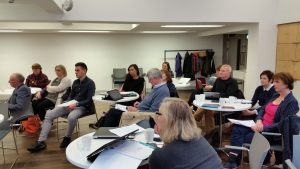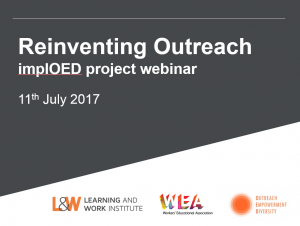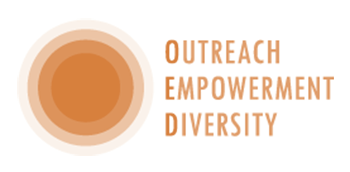IMPLEMENTING OUTREACH, EMPOWERMENT, DIVERSITY.  The ImplOED webinars organised in the United Kingdom focused on outreach. The conclusions of the events organised underlined the need to put the learner in the centre of activities.
The ImplOED webinars organised in the United Kingdom focused on outreach. The conclusions of the events organised underlined the need to put the learner in the centre of activities.
The UK implOED team decided to focus mainly on ‘outreach’, since this concept has been relatively neglected in non-formal and community learning in recent years in UK policy and practice, whereas diversity has been comparatively well supported. To this end, we have led three workshops – two face to face, in very different contexts, and one by webinar to have a wider reach. The title of the workshops was ‘Re-inventing Outreach’. This title was influenced by Veronica McGivney’s ‘Recovering Outreach’ (NIACE, 2000) as it was considered that this was a good starting point for discussion about the OED materials and the implOED project.
Definitions of outreach used were:
- Delivery of programmes in community settings, including village halls, pubs, faith-related buildings, community centres, and so on, rather than in learning establishments / classrooms.
- Working with a range of people/groups in communities to bring them into community learning / outreach sessions as above or to course in colleges / learning centres
- Engaging with people / groups in communities to plan and design their own learning – for all kinds of purposes but also or even particularly around improving communities.
 One workshop took place at a meeting of the National Older Learners Group, which comprises a range of organisations with an interest in older people’s learning. This group serves as both a network and an interface between officials from across government and the adult learning sector. The second workshop was held in Belfast, Northern Ireland. The workshop was preceded by a workshop about EPALE and was part of the the Belfast Festival of Learning.
One workshop took place at a meeting of the National Older Learners Group, which comprises a range of organisations with an interest in older people’s learning. This group serves as both a network and an interface between officials from across government and the adult learning sector. The second workshop was held in Belfast, Northern Ireland. The workshop was preceded by a workshop about EPALE and was part of the the Belfast Festival of Learning.
The workshop attracted a wide range of professionals and practitioners. A considerable number of the participants represented organisations which focus on disability, while others were community based or were traditional further and higher education providers. The shape of the workshops and the webinar was to introduce a discussion on the meaning of outreach in the current contexts of our work. We aimed to clarify understandings of outreach, to re-think outreach, empowerment and diversity, to disseminate the OED materials and to promote EPALE.
In the case of the first workshop, we focused particularly on outreach, empowerment and diversity in relation to learning and ageing, and in trying to deepen our understanding across learning in the second half of life. In the second workshop the focus was more on outreach at community level. In all three workshops we used as a case study the example from the OED materials ‘Language courses in the Park’ – Vienna – to engage more effectively with migrants with little previous experience of schooling.
In the webinar, Karen Chouhan of the Workers Educational Association was the guest speaker, talking about outreach practice. The importance of introducing outreach, empowerment and diversity in initial teacher training for adult educators was raised by many participants. Although in theory diversity and inclusion are covered in training, it was felt that this is not done at a sufficiently deep level and improved understanding and practice is not guaranteed.
It was agreed by participants that outreach today should be part of an overall approach – including co-design with learners, as well as with stakeholders, of curricula, accessibility and language. Capacity building and community cohesion remain vital ingredients to successful inclusive learning practice.
Conclusions of all the sessions focused on the need for respect – the concept of respect drives this work and the need to place the learner at the centre of all that we do. This drives outreach, empowerment and diversity by making all the work accessible, respectful and relevant for all. It enables us to widen our learning offer, the kinds of learners we work with and serves to widen the horizons of all learners and practitioners.
Text: Learning and Work Institute
